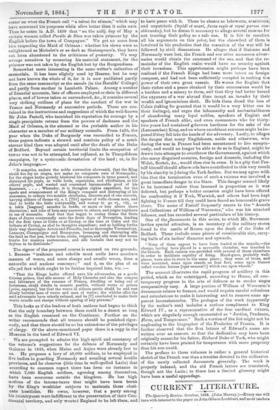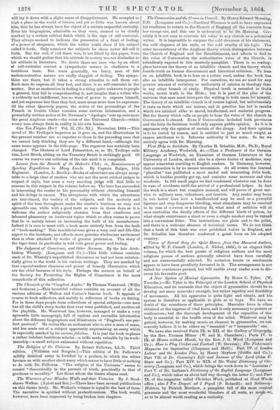CURRENT LITERATURE.
The Quarterly Review. October, 1864. (John 3lurray.)—Every one will turn with interest to the paper on John Gibson Lockhart, and most readers
will lay it down with a slight sense of disappointment. He occupied so high a place in the world of letters, and yet so little was known about him, that he has always been the object of a certain respectful curiosity. Even his biographies, admirable as they were, seemed to be chiefly marked by a certain critical finish which is the sign of self-restraint. They always seemed to indicate the possession of a fund of feeling, of a power of eloquence, which the writer could show if his subject called it forth. Only somehow the subjects he chose never did call it forth. But the veil, if veil there was, is not lifted by this paper, from which we should gather that his attitude in society was not dissimilar to his attitude in literature. No doubt there are men who by an effort of self-restraint conceal a sympathetic nature in obedience to a fastidious taste. But more generally, we fancy, men of this undemonstrative nature are really sluggish of feeling. The sympa- thies are there, but it takes a strong stimulus to call them out.
Such men do express all they feel, and there is no self-restraint in the matter. But as moderation in feeling is a thing quite unknown to people
n general, they fail in comprehending it, and imagine that a writer who
s evidently not indifferent, has no want of power to express himself, and yet expresses less than they feel, must mean more than he expresses.
Of the other Quarterly papers, the notice of the proceedings of the French in Cochin China contains some curious information, and a powerfully written notice of Dr. Newman's "Apologia" sets up once more the great Anglican oracle—the voice of the Universal Church—which every man always finds in reality in his own bosom.































 Previous page
Previous page